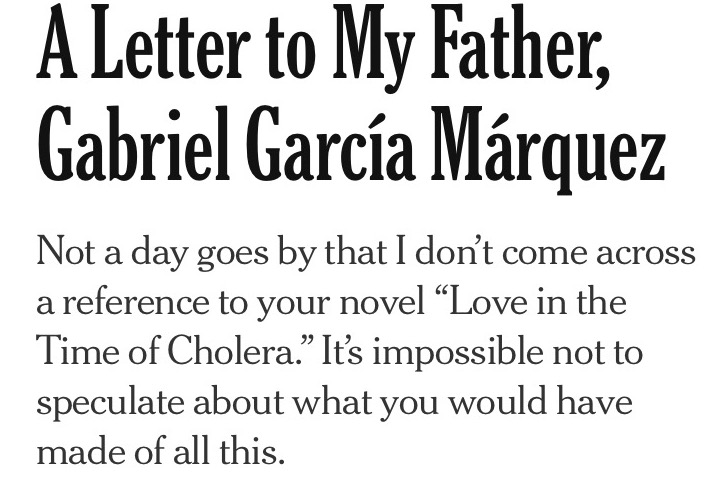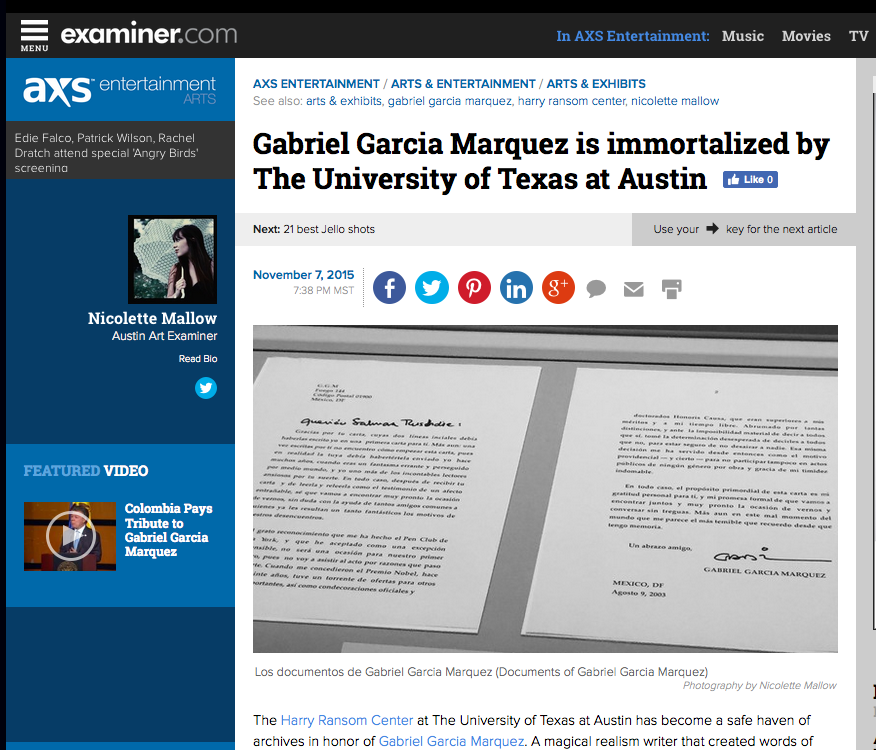
Fotografía de Nicolette Mallow. Pasaporte de Gabriel Garcia Marquez, 1969-1976.
As the COVID-19 quarantine began all over the globe, I knew the world news would be flooding, a swarm with coronavirus headlines, stories, and coronavirus-inspired artwork. I also thought of Gabriel García Márquez and his beloved book “Love in the Time of Cholera.” There is only one Márquez, just like there can only be one Detective Poirot, and I didn’t feel qualified to write about Love in the Time of Coronavirus. For weeks, during this time of social distancing, I waited for someone else to publish a play on Márquez’s words. I just knew someone else would and the story would go viral. So I waited. And I was delighted to read a story in The New York Times by Rodrigo Garcia, Marquez’s son. Rodrigo Garcia titled the piece “A Letter to My Father, Gabriel García Márquez.” How perfect that his son wrote a letter to Márquez about love in the time of coronavirus!
Márquez is one of my favorite writers, and this book “El Amor en Tiempos de Cólera” (Love in the Time of Cholera) holds one of my most beloved quotes ever written. Because of Márquez, I started to adore the genre magical realism, a genre Marquez created by accident. Simply because the words flowed from his imagination onto paper. How could I, and millions of other Márquez lovers, not think of the word—Love in the time of Coronavirus—during this strange, obscure and melancholy time of life?

The letter written by Garcia to Gabo (his father) was fascinating, like listening to a private conversation between father and son, artist to artist. Garcia’s voice and the imagery as he spoke to his father beyond the grave were endearing, and you can see Márquez’s influence in his writing. Yet, Garcia holds his own voice, too, so it’s interesting to see the two styles. It’s a beautiful, evocative tribute to his father since Rodrigo Garcia knew Márquez at heart and not just through the pages like I did. True, Márquez spoke to all our hearts, the readers, the lovers of magical realism. But Rodrigo Garcia spent decades growing up with him and knowing details that we didn’t. For instance, in his letter, Garcia mentions his father’s greatest fear, something that Marquez dreaded when he was alive: loneliness. You must read it all, but I believe my favorite quote is this.
“I think that if you were here now, you would, as always, be enthralled by man. The term “man” is not much in use that way anymore, but I’ll make an exception not as a nod to the patriarchy, which you detested, but because it will echo in the ears of the young man and aspiring writer you once were, with more sensibility and ideas in your head than you knew what to do with, and with a strong sense that destinies are written, even for a creature in God’s image and cursed with free will. You would pity our frailty; you would marvel at our interconnectedness, be saddened by the suffering, enraged by the callousness of some of the leaders and moved by the heroism of people on the front lines. And you would be eager to hear how lovers were braving every obstacle, including the risk of death, to be together. Most of all, you would be as endeared to humans as you ever were.” – Rodrigo Garcia
My favorite line of that paragraph is when Garcia mentions lovers braving death in coronavirus: Márquez was a die-hard romantic! He had a love for life and an even deeper appreciation for love… A few years ago, I wrote a publication for Examiner.com about an art exhibition at The University of Texas at Austin regarding Marquez.
Born the year of 1927 in Colombia, Gabriel Garcia Marquez died of pneumonia in Mexico City circa 2014. A great artist was lost that day. The New York Times ran an article soon after the writer passed that read, “Mr. García Márquez, who received the Nobel Prize for Literature in 1982, wrote fiction rooted in a mythical Latin American landscape of his own creation, but his appeal was universal. His books were translated into dozens of languages. He was among a select roster of canonical writers — Dickens, Tolstoy and Hemingway among them — who were embraced both by critics and by a mass audience. Mr. García Márquez was a master of the literary genre known as magical realism, in which the miraculous and the real converge. In his novels and stories, storms rage for years, flowers drift from the skies, tyrants survive for centuries, priests levitate and corpses fail to decompose. And, more plausibly, lovers rekindle their passion after a half-century apart.”
Gabriel Garcia Marquez was a magical realism writer that created words of mysticism, beauty, love and tragedy. Marquez, also known as Gabo, had an eternal voice that was so unique it created its own writing genre. Marquez takes readers to another dimension within reality, like magic, and he can evoke heartfelt emotions that linger like the smell of fine perfume in the air, or a tender kiss on the skin.

And now for one of my favorite quotes of all-time from his novel “El Amor en Tiempos de Cólera” (Love in the Time of Cholera).
“Así termino pensando en él como nunca se hubiera imaginado que se podía pensar en alguien, presintiéndolo donde no estaba, deseándolo donde no podía estar, despertando de pronto con la sensación física de que él la contemplaba en la oscuridad mientras dormía, de modo que la tarde en que sintió sus pasos resueltos sobre el reguero de hojas amarillas en el parquecito, le costó trabajo creer que no fuera burla de su fantasía.”
English Translation: “And so she thought about him as she never could have imagined thinking about anyone, having premonitions that he would be where he was not, wanting him to be where he could not be, awakening with a start, with the physical sensation that he was looking at her in the darkness while she slept, so that on the afternoon when she heard his resolute steps on the yellow leaves in the little park it was difficult for her not to think this was yet another trick of her imagination.”
– Gabriel García Márquez
